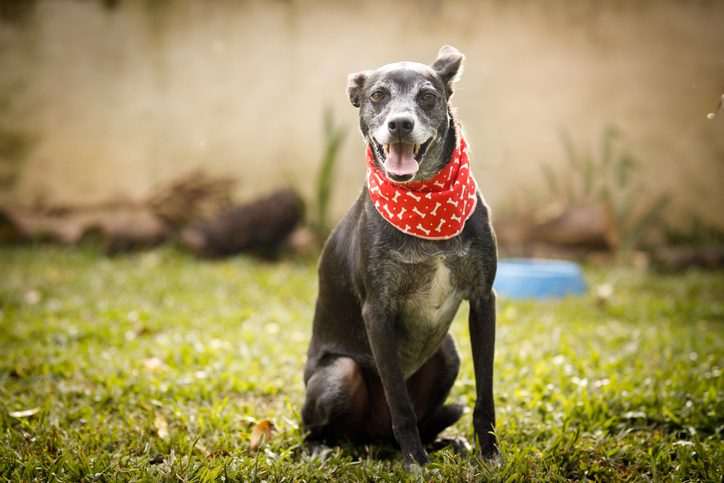6 Tips When Caring for a Senior Dog in Branson, MO
Taking care of a senior dog can be difficult for some pet owners. It’s hard to watch your dog shift into this stage, and it can be challenging to support them through this time as well. However, it’s also very important to learn how you can provide the best care possible for your pet during their senior years.
Below, you’ll find out some tips and suggestions to help your dog through this time in their life. Read through this information to get a better idea of what to expect for caring for a senior dog.

1. Limit High Impact Play
The older your dog gets, the harder it will be for him/ her to enjoy high impact play and exercise involving running, jumping, and climbing. Instead, keep exercise and playtime a little bit calmer to prevent unnecessary injury or arthritis flare up.
At this age, your dog may have arthritis or may be much more prone to developing it. By reducing the amount of high impact exercise you can protect their joints which helps maintain long term mobility.
2. Keep Food and Water Close
Dogs in their later senior years may have trouble getting up out of bed and moving around a lot. They may be stiff and uncomfortable from arthritis, especially while they’ve been asleep for a while, and they may be less inclined to walk around the house because of this.
You can help your dog find his/ her food and water more easily by keeping it closer by when mobility is limited. This tip also works well for dogs who may be losing their sight or hearing and might not feel as comfortable exploring the house as they once did.
Some senior pets will begin to suffer from cognitive confusion and impairment so keeping their food and water close by and consistently in the same place so they don’t get confused is important. Also keep on a routine and don’t switch things up on them much as this can cause undue stress and anxiety.
3. Provide Orthopedic Support
Arthritis and other joint disorders can especially cause pain and joint stiffness while dogs sleep. Therefore, it’s a good idea to give your dog an orthopedic support bed that better supports the joints and feels more comfortable at naptime.
These beds come in a wide variety of options including memory foam, eggshell foam, cooling, warming, and much more. You know best what type of orthopedic support bed your dog would like, but you can also ask your veterinarian for some suggestions and guidance toward choosing the right one. Pick a bed with a removable cover for easy washing just in case your senior dog has an accident on it.
4. Choose a Healthy Diet
As your dog ages, their dietary and nutritional needs will change. They need a diet that is healthy and well-balanced for the senior age and life stage, which means you may need to think about changing their current food to a new one especially formulated for senior citizens.
If you need to change your senior dog’s kibble, do so slowly, adding just a little bit at a time to the old food until he/ she is eating only the new food. Otherwise, you may risk upsetting their stomach, which could be more sensitive than it used to be when they were younger.
5. Keep Up with Vet Checkups
Although it is important to keep up with regular vet checkups for your pet throughout their life, it is especially important to do so when you have a senior dog. This way, the vet can help you stay on top of managing any chronic health problems your dog may have and can help you recognize signs and symptoms of disease before they progress beyond medical intervention. Sometimes the changes are subtle and cannot be seen from normal physical exam. This is why our veterinary staff will recommend a senior blood profile to asses underlying organ function.
Additionally, these regular vet visits give you a chance to talk to your veterinarian about the health needs of your dog as they get older. If you have questions or concerns the vet can help.
There are many medications and all-natural supplements that can help your pet feel the best and be the healthiest at this special time of their life. Sometimes pain and distress can be unnoticeable and many people don’t recognize the subtle signs that a pet will display that tells you they are in pain or discomfort. The veterinary staff are trained to notice those changes and can help them be more comfortable.
6. Give Medication on Schedule
Finally, be sure you give your dog their medications on the correct schedule and dosing. If your dog takes a regular medication for a chronic health condition, for pain, for allergies, or for any other reason, sticking to a consistent routine and schedule is crucial in ensuring your dog’s health and wellness during this stage of their life.
Talk to your vet for specific instructions on when and how to give your dog their medication. If you think the medication dosage needs to be changed at any time, be sure to run this by your vet first as well.
In Conclusion
Caring for a senior dog poses a unique set of challenges that can be difficult. However, with the right planning and preparation, you can make sure your senior dog gets the best possible care and lives life to the fullest, even during the golden years.
Make sure you work with a trusted vet throughout your dog’s life, including the senior stage. This way, your dog will be able to see a vet who knows him/ her well and can understand what the needs based on the individual wellness and health history.
To talk with your trusted veterinarian at Shepherd of the Hills Veterinary Clinic call 417-337-7389 or use the online form!
Recent Posts
Understanding Parvovirus: What Every Pet Owner Needs to Know
Parvovirus is one of the most serious — and preventable — diseases that can affect our furry…
Pain in your Pet
As a veterinary professional, the most common fallacy owners hold about their animals is that their beloved…
Heat Exhaustion and Heat Stroke
Summer is and should be a time of outdoor fun and activities. Swimming, boating, fishing, hiking, camping,…
Why is my Cat Pooping Outside the Litterbox in Branson, MO?
If your cat has been pooping outside the litterbox, you’re probably feeling frustrated and worried at the…
Is Dog Neutering in Branson, MO Necessary? 9 Reasons Why It Is
For dog parents, especially first-time dog parents, the decision to neuter your sweet little boy dog can…
About Shepherd of the Hills Veterinary Clinic
Founded in 2018 by Dr. Amanda McGinty, we are a full-service animal hospital with a passion for pets and a commitment to community. We offer high-quality, competitively-priced care for Branson-area cats, dogs, rabbits, and pocket pets. At Shepherd of the Hills Veterinary Clinic, we want to provide the best healthcare possible, so we are fully equipped with state-of-the-art imaging and laboratory testing. In addition to carrying the latest technology, we value education and best-in-class care. Therefore, we are Fear Free certified, and Dr. Amanda utilizes a holistic approach using up-to-date modern medicine in addition to herbal and alternative therapies.







